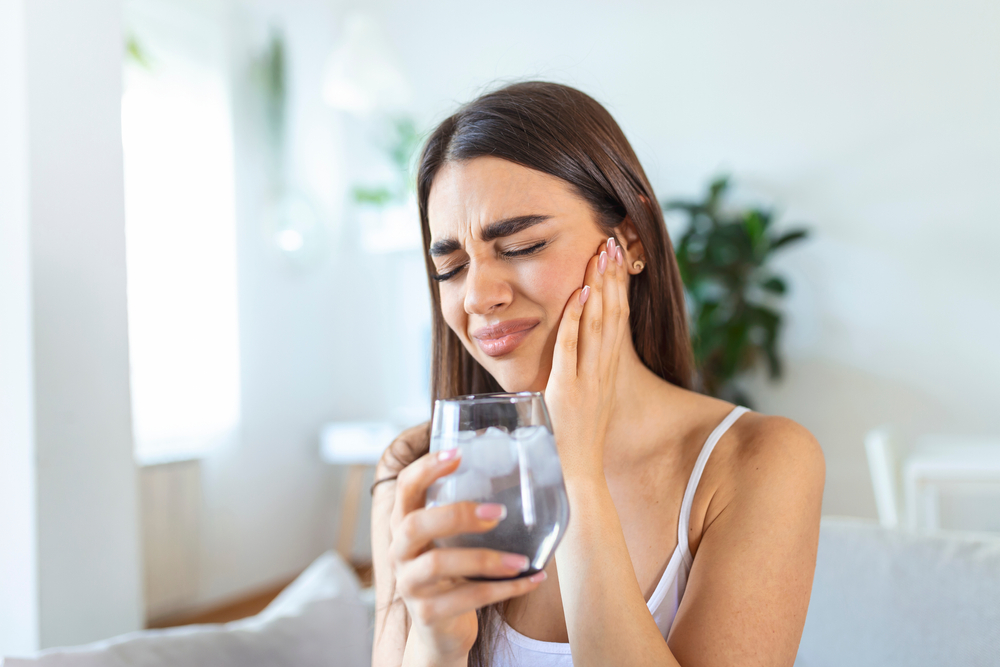Have you ever bitten into something hot or cold and felt an immediate surge of pain in a tooth? Dental sensitivity, especially to temperature, is often an early sign of an issue. If you notice that the same tooth is frequently hurt when you drink hot or iced beverages or eat hot or cold food, your teeth might be telling you something. When our teeth are doing well it is much harder for extreme temperature from what we eat and drink from getting to the nerves in our teeth. In this article we will discuss why your teeth feel sensitive to cold/hot foods, how to fix it, and when to see a dentist. If you need a dentist in the Lewiston Maine area, give us a call or click below.

What Causes Temperature Sensitivity In My Teeth?
Before we talk about preventing tooth sensitivity or reversing tooth sensitivity, let’s discuss the cause. The outermost layer of our teeth is the enamel, under the enamel is dentin, and then the pulp and roots. Inside the pulp and roots are the nerves of our teeth. That is why you are more likely to feel the bristles of your tooth brush on your gums than on your teeth. While you might feel pressure, there are no nerves at the surface of our teeth.
So why do we feel pain when we drink cold or hot beverages? Bacteria in our mouth can cause a process known as demineralization. Demineralization is the deconstruction of our bones or teeth. In our mouths this happens when the enamel is deconstructed because of bacteria left behind from food and beverages. Drinking highly acidic beverages or sugary foods can lead to loss of enamel. This can lead to hot or cold items suddenly causing pain because the outer layer of the tooth is no longer there. Our tooth nerves are highly sensitive because they are usually covered. If you feel sudden pain, it is because your teeth are showing signs that they are damaged.
How Can I Fix Tooth Sensitivity?
There are a few things you can do to address dental sensitivity including:
- Drink Through A Straw: If you are drinking and ice cold beverage, you might want to use a straw. This ensures that your teeth aren’t immediately coming in contact with the ice-cold liquid. And the warmth of your mouth will likely take the bite out of a cold beverage.
- Practice Good Oral Care: Brushing twice per day and flossing daily can prevent the risk of demineralization. In fact, existing enamel can be rebuilt and strengthened by practicing good oral health and seeing your dentist. But, if your enamel is stripped off of a tooth, it might be permanently gone.
- Get Toothpaste Made For Sensitivity: A variety of kinds of toothpaste make claims about providing specific benefits like cavity prevention, sensitivity reversal, teeth whitening etc. When looking for a toothpaste consider a few things. First, is it approved and showing the ADA (American Dental Association) seal? Second, does your dentist recommend it? For the most part, many name-brand types of toothpaste are relatively similar in benefits, and a lot of on-the-box claims are jut the marketing department a/b testing which slogan/benefit is going to lead to the most sales. In fact, almost any good toothpaste provides all of those benefits including preventing cavities and improving tooth sensitivity. But if you are questioning with toothpaste to buy, it never hurts to ask a dentist.
- Avoid Unsafe Temperatures: We are all guilty of eating and drinking things that are too hot or too cold. We have all burnt the roof of our mouths on a slice of pizza or sipped on a smoothie until we got brain freeze. It is important to understand that not only are our teeth sensitive to extreme temperatures, but so are our mouths, throats, and stomachs. Avoid drinking and eating foods that are at extreme temperatures.
When Should I See A Dentist About Tooth Sensitivity
First and foremost, you should see a dentist twice a year, every year. This is the safest way to protect your teeth and gums. But you might want to move an appointment up if you notice extreme tooth sensitivity, or if tooth sensitivity is localized and recurring. For example, if all of your teeth hurt dully after a sip of a near boiling cup of coffee, that might just be a natural reaction to the extreme heat and it will subside. But if you notice that a specific tooth or specific area of a tooth is consistently feeling pain when you drink your morning cofee, this could be a sign of an issue.
Schedule A Family Dental Appointment in Maine
If you live in the Southern Maine area and are interested in setting up a family dental appointment, our team of dentists would be happy to get an appointment for your child. We believe that the key to good family dentistry is providing a safe, non-judgmental space for kids and adults to get dental treatments and learn more about brushing and flossing.
